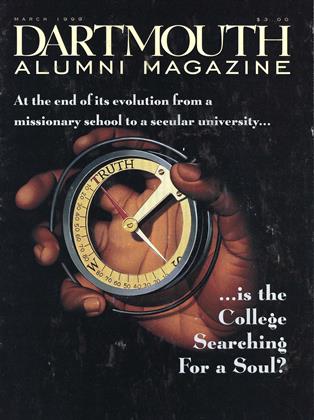WHEN THE TUCKER FOUNDATION was formed in 1951 "for the purpose of supporting and furthering the moral and spiritual work and influence of Dartmouth College," Wheelock's two-part mission was neatly split. The classroom would stick with academic education, and moral education would become the province of the new foundation, whose dean would also be the College's official moral and spiritual head. Indeed (except for one brief period), from Fred Berthold '45 through Warner Traynham'57 and James Breeden's6, the dean of the Tucker Foundation and the College chaplain have been the same person. The relationship changed, though, two and a half years ago when Scott Brown '78, a specialist in negotiation and conflict resolution, became Tucker dean. By that time, the College had become comfortable with the idea that the moral and spiritual work of the College could be led by someone without a collar.
Not everyone, however, was comfortable—and now they have another chance to voice their views. In January, in the midst of the College's search for a permanent College chaplain, Scott Brown unexpectedly announced his resignation from the Tucker Foundation. Although his departure is unrelated to the question (he is leaving to complete two books), Brown notes that, "This gives the search committee time to reconsider whether or not a single person should be both the dean of the Tucker Foundation and the College chaplain." Brown sees wisdom in both options. "A dean who is the chaplain can speak more forcefully about creating a comfortable place for students with strong religious views. On the other hand, a dean who is the chaplain—who will ultimately make decisions about religious life—may have his or her biases questioned by those of other faiths. And, of course, a dean who adds the responsibilities of chaplain will need to balance the great demands for pastoral care with the responsibility to manage well the other roles of the Tucker Foundation."
The Solomic decision will ultimately fall to incoming provost Susan Prager.
 View Full Issue
View Full Issue
More From This Issue
-
 Cover Story
Cover StoryWhat Does Dartmouth Cry For?
March 1999 By Robert Sullivan '75 -
 Feature
FeatureMoney and Luck
March 1999 By Regina Barreca '79 -
 Feature
FeatureFirst person
March 1999 By Heather McCutchen '87 -
 Article
ArticleA Tale of Two Libraries
March 1999 By Noel Perrin -
 Article
ArticleExercising the Mind
March 1999 By Rich Barlow '81 -
 Sports
SportsSilver Honors for Ivy Women
March 1999 By Sarah Hood '98







